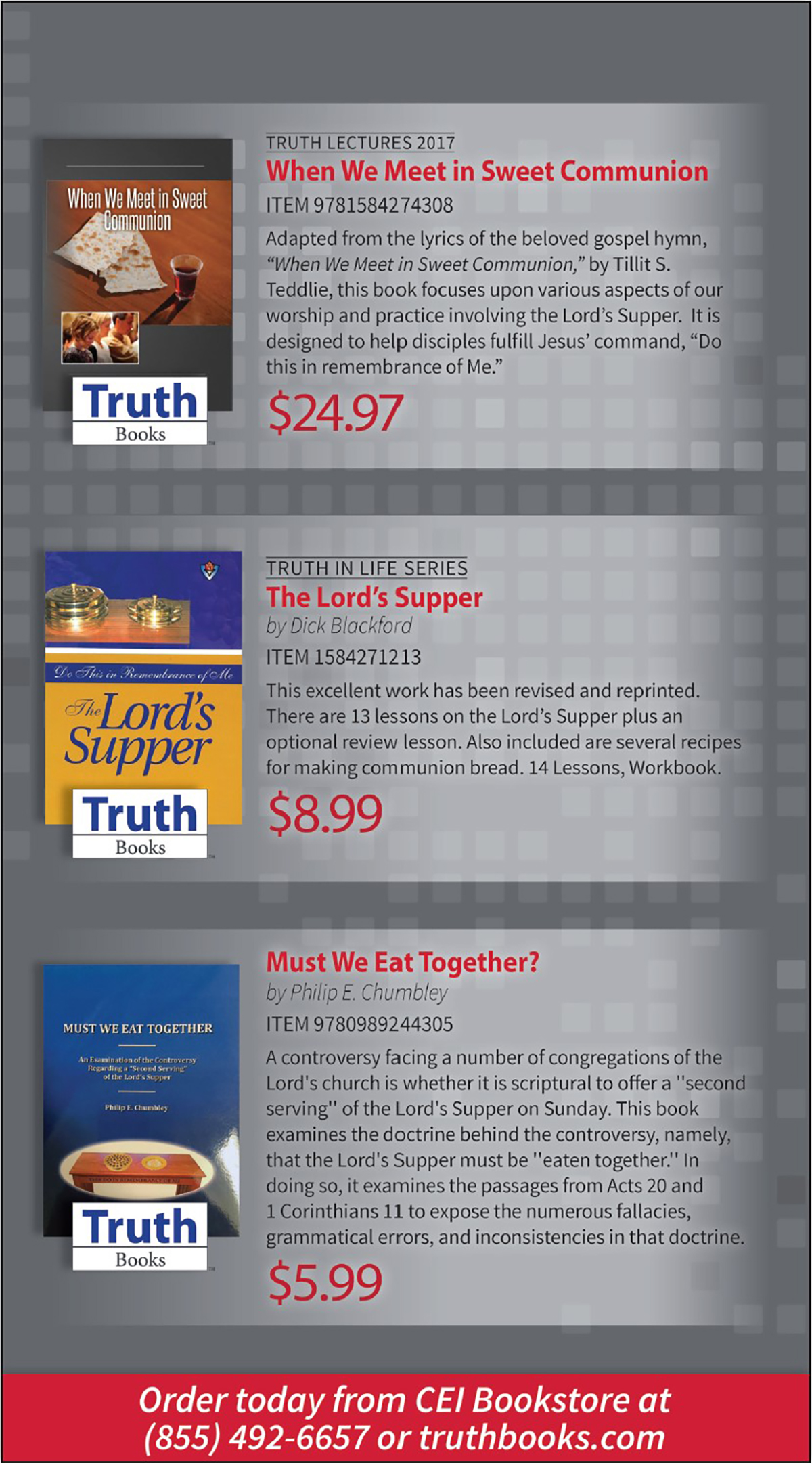


by Bobby L. Graham
Some are now contending for the Lord's Supper to be eaten as part of a full meal. Is this because of the context of 1 Corinthians 11?
Such attempts to revise or renovate the Lord's Supper into a full-fledged common meal were unheard of before twenty to thirty years ago, but people such as John Mark Hicks and F. LaGard Smith somehow, somewhere, and sometime learned something "new." There is no telling which rock they overturned to discover this new information because they did not find it in the Bible.
Both men contend that complete "table fellowship" is needed for us to experience what first-century Christians experienced when they ate the supper. Some maintain that the love feast (agapē) was involved in New Testament gatherings, even in 1 Corinthians 11. One wonders if the Holy Spirit and the apostle Paul had never learned what these men somehow learned, in spite of Paul's teaching that the "Spirit searches all things, even the deep things of God" (1 Cor. 2:10). Whoever heard of such in the Bible? The closest I can get to this idea is the desecration being acted out as the Corinthians abused the Lord's Supper to the extent that Paul even denied that they came together to eat the Lord's Supper, saying they came together for the worse, not the better (1 Cor. 11:17, 20).
Smith did say that the Lord's Supper arose out of a full meal, the Jewish Passover. "Without question, on the occasion of its inaugural introduction—there in the upper room on the night Jesus was betrayed—the memorial was part of an actual meal being shared" (Radical Restoration, 129). He further wrote on page 133, "The Lord's Supper gave meaning to their table fellowship, and their table fellowship gave meaning to the Lord's Supper." Possibly these quotations explain why such men contend for a full meal or full table fellowship.
Nevertheless, I judge that they overlook specific facts, to which I now call attention.
Christ personally commanded this part of New Testament worship when He and His disciples had eaten the Passover meal. Notice that He instituted a new feast and did not perpetuate the old one. It is never called the Passover, but "the Lord's Supper." It is a different meal in that He began it "after supper" (Luke 22:20).
The same foods which had formed the Passover meal were available to Jesus and the disciples, but He used only two of them in this new meal. While roasted lamb and bitter herbs could have been His choice, only the unleavened bread and the fruit of the vine were present in this new meal, the Lord's Supper. Jesus did not offer the three or more cups in this new meal, as was done in the Passover; He instituted this new supper by offering the cup to His disciples only one time.
Jesus assigned to the bread an association with His body that was offered on the cross. The cup/fruit of the vine was associated with His shed blood (Matt. 26:26-28). These were new meanings, altogether different from what was signified in the Passover supper.
The Passover served as a reminder/memorial of Israel's deliverance from Egyptian bondage in the Exodus (Exod. 12:17), whereas the Lord's Supper served as a reminder/memorial of Jesus's sacrificial death to release people from their sins (Matt. 26:27-28).
The Israelites ate the Passover supper on the night before leaving Egypt—in preparation for their departure and journey. On the night when Jesus ate with the disciples, it served as a full meal, as commonly was the case in Israel. When the time came for Jesus to institute the Lord's Supper, full stomachs would imply to us that this second meal was not designed or intended to do the same but to memorialize Jesus' death. While no mention is ever made of the amount consumed, it is clear that the purpose would forbid eating as one would do at mealtime. It was a different kind of meal. Some mock those who "pinch and sip" in observing the Lord's Supper. Yet, they fail to show where Jesus intended that partaking of this meal was ever meant to fill the stomach or satisfy the appetite. Surmising is not the same as the citation of evidence!
When Paul wrote to the Corinthians about their gathering on the first day of the week to eat, he did not approve of what they were doing, including approaching it as a common meal. In fact, the apostolic correction told them to eat at home. Paul could have told them to change the way they were eating their common meal, but he did not. He commanded them to eat at home. I conclude that adding a common meal to the supper is an addition not acceptable to God, regardless of what learned men might say.
Author Bio: Bobby actively participates in fill-in preaching, Belize trips, teaching an hour each day at Athens Bible School, and in gospel meeting work. He and his wife, Karen, have three children. He can be reached at bobbylgraham@pclnet.


